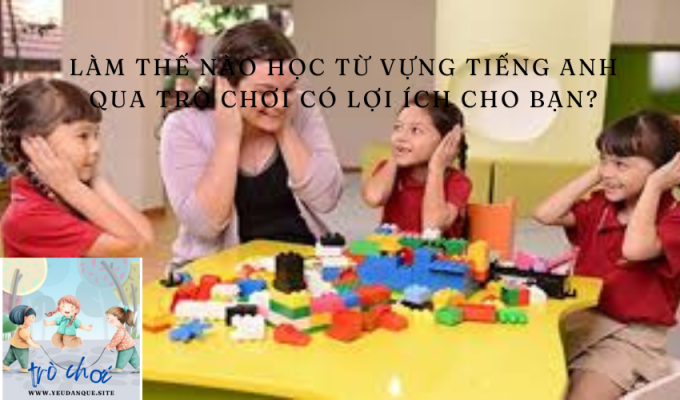Learn the benefits of learning English vocabulary through games.
Introduction to learning English vocabulary through games
When learning English vocabulary for children, using games is an effective method to help children learn in a fun and effective way. Games help children interact with vocabulary in a natural and interesting way, thereby helping children remember vocabulary more easily. Using games also helps children develop social skills, logical thinking and creativity.
How to learn English vocabulary through games
There are many ways to learn English vocabulary through games. Here are some popular methods you can apply:
- Use flashcards: Create flashcards with pictures and English vocabulary, then use them in games like puzzles, matching, or playing Memory cards.
- Play active games: Use English vocabulary in games like jumping rope, racing, or catching letters to help children remember vocabulary naturally.
- Design group games: Create group games such as team racing, role playing, or vocabulary competition to stimulate competition and learning among children.
The importance of learning vocabulary in English
Learning vocabulary in English plays an important role in children's learning process. Vocabulary is the basis for understanding and using language accurately and flexibly. When children know more vocabulary, they are able to express their ideas and thoughts more clearly and precisely. This helps children develop language and communication skills comprehensively.

Benefits of learning vocabulary in English
The benefits of learning English vocabulary for children include:
- Develop language skills: Learning vocabulary helps children expand their vocabulary, thereby improving their ability to express and understand language.
- Enhance communication abilities: A rich vocabulary helps children become more confident when communicating and interacting with others.
- Develop logical thinking: Learning vocabulary also helps children develop logical thinking and creativity when using words in different situations.
Learning vocabulary in English not only helps children improve their language skills but also has a positive influence on their comprehensive development.
Benefits of learning English vocabulary through games
1. Enhance memory ability
Learning English vocabulary through games helps children become more focused and interested, thereby creating the best conditions for memorizing vocabulary. When participating in fun activities, children will easily remember vocabulary compared to studying through books.
2. Develop social skills
Learning English vocabulary through games also helps children develop social skills. When participating in group games, children will learn how to communicate, cooperate and share with friends. This is a great opportunity for children to practice and develop these skills from a young age.
3. Create joy and excitement in learning
When learning English vocabulary through games, children will feel happier and more interested. Creating an interesting and positive learning environment will help children not feel pressured but even want to learn more. This will help children have a positive spirit and love learning English more.
How games help improve English vocabulary
1. Vocabulary matching game
A fun way to help children improve their English vocabulary is through vocabulary matching games. Parents and teachers can prepare vocabulary cards with corresponding pictures and words, then ask children to pair the correct vocabulary words. This will help children recognize vocabulary, images and pronunciation in a natural and interesting way.
2. Vocabulary puzzle game
Another game that helps improve English vocabulary is vocabulary puzzles. Parents and teachers can prepare puzzle pieces with printed English vocabulary and corresponding images. Children will have to arrange the correct vocabulary and images to complete the picture. This game not only helps children remember vocabulary but also develops their logical thinking and ingenuity.
3. Vocabulary quiz game
To create excitement for children in learning English vocabulary, parents and teachers can organize vocabulary quiz games. Children will be asked to find vocabulary that corresponds to the image or description given. This will help children expand their vocabulary in a natural and interesting way.
Improve communication skills through learning vocabulary through games
Learning vocabulary through English games for children not only helps children remember vocabulary more easily but also improves their communication skills. When participating in games, children will have the opportunity to use vocabulary more naturally and flexibly, thereby helping them develop the ability to communicate and convey their opinions clearly and accurately. .
Benefits of learning vocabulary through games:
- Children will learn vocabulary in real-life contexts, making vocabulary more vivid and easier to remember.
- Children's communication abilities will be improved through the use of vocabulary in games and interactive activities with friends.
- Children will develop the ability to express their opinions and thoughts through the use of vocabulary in different situations.
Discover how learning English vocabulary through games helps develop language skills
English vocabulary is an important part of the process of learning English for children. Learning vocabulary through games not only helps children remember vocabulary longer, but also develops their language and communication skills in a natural and fun way.
Benefits of learning English vocabulary through games:
- Helps children remember vocabulary longer
- Develop language and communication skills
- Create fun and excitement in the learning process
- Promote children's creativity and imagination
- Helps children become more confident when using English vocabulary in daily communication
By applying English vocabulary learning games, children will have the opportunity to interact and use vocabulary more naturally and effectively, thereby developing comprehensive language skills.
Positive effects of learning vocabulary through games on natural English learning
1. Enhance memory ability
Learning vocabulary through games helps children stimulate their brains and create connections between vocabulary and real-life experiences. When children are involved in fun activities, it will be easier for them to remember vocabulary through applying vocabulary to real-life situations and activities.
2. Create excitement and passion
Learning vocabulary through games helps create excitement and passion in learning English. Instead of having to sit boringly and learn vocabulary in the traditional way, children will find learning English an enjoyable experience and they will want to learn more through participating in creative and engaging games. guide.
Practice English vocabulary through games and applications in daily life
Practicing English vocabulary through games not only helps children learn happily, but also helps them apply vocabulary to everyday life naturally. When children participate in English games, they will be exposed to vocabulary in a fun and easier way to remember. Applying vocabulary to daily life also helps children better understand the meaning and usage of each vocabulary word.
Vocabulary applications in everyday life may include:
- Practice everyday communication in English, for example when going out, shopping, or participating in fun activities.
- Use vocabulary to describe objects, actions, emotions and your psychological state.
- Engage in learning and entertainment activities in English, such as watching movies, reading books, listening to music, or playing games.
Practicing English vocabulary through games and applications in daily life helps children develop comprehensive language skills and become more confident in using a second language.
How to effectively increase English vocabulary knowledge through games
Enhancing children's English vocabulary knowledge through games is an effective and engaging method. Games help children learn vocabulary naturally and happily, facilitating long-term vocabulary memorization. At the same time, games also help children develop social skills and logical thinking.
Ways to improve English vocabulary knowledge through games:
1. Vocabulary jigsaw puzzle: Use pictures or flashcards to create a vocabulary jigsaw puzzle. Children will learn vocabulary through putting pieces together, and they will also visualize and remember vocabulary more easily.
2. Vocabulary quiz game: Create questions or quizzes related to the English vocabulary that children are learning. Answering questions or solving puzzles not only helps children remember vocabulary but also stimulates logical thinking and creativity.
3. Group competition games: Organize group competition games such as vocabulary racing, vocabulary chess, or vocabulary quizzes to create opportunities for children to actively practice and remember vocabulary . Competition will motivate children to learn vocabulary quickly and effectively.
Summary of the positive effects of learning English vocabulary through games
Learning English vocabulary through games not only helps children develop language naturally but also brings many other benefits. Below are the positive effects of learning English vocabulary through games:
Benefits for language development
– English games help children learn vocabulary in a fun and interesting way, creating excitement and passion in learning English.
– Learning vocabulary through games helps children remember vocabulary longer and use vocabulary more flexibly and accurately.
Benefits for children's comprehensive development
– English games help children develop social skills, logical thinking, creativity and critical thinking.
– Participating in English games also helps children practice motor skills and comprehensive health.
Learning English vocabulary through games not only helps children master the language but also creates comprehensive and positive experiences for their development.
English vocabulary can be learned effectively through games, helping children develop language skills and logical thinking in a natural and interesting way.



